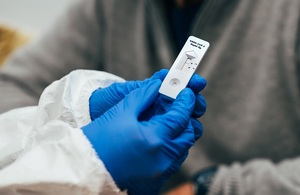Government Chemist conference 2021: Safe food for tomorrow’s world
The Government Chemist conference, ‘Safe food for tomorrow’s world’ took place online on 23 and 24 June 2021.
Presentations from this conference are available.
You can also read a short report on the conference.
Conference information as published before the event
This conference was originally scheduled to take place in June 2020 and was postponed to June 2021 as a consequence of the Covid-19 pandemic. In view of the ongoing restrictions for public events, we have decided to proceed with this conference as an online event.
The conference will be opened by Gideon Henderson, Chief Scientific Adviser, Defra after a brief introduction by Dr Julian Braybrook, Government Chemist.
Scientists, regulators, enforcement agencies, industry and policy makers are invited to join the Government Chemist on a virtual platform to discuss future challenges in the manufacturing, packaging, retailing and testing of food that is safe and consumers can trust.
The conference programme will include national and international perspectives on assuring food safety and integrity, advances and challenges in allergen testing, the use of science for improved consumer protection and much more.
Defra Deep-dive workshop session: Consumer confidence in food integrity and authenticity beyond composition
The conference will include a Deep Dive session, between Session 1 and 2, aiming to explore some of the emerging trends impacting on our food system and discuss what the integrity of the food supply looks like in a post pandemic/EU Exit world – from industry, consumer and enforcement perspectives.
23 June, Session 1: Perspectives from the UK’s Official Control System
-
Welcome address by the Government Chemist, Julian Braybrook
-
Keynote lecture – Gideon Henderson, CSA, Defra
-
Overview of recent referee cases- Paul Hancock, LGC
-
Opportunities and challenges facing the Public Analyst Service – Jane White, Association of Public Analysts
-
Actions and impact of the Food Crime Unit – Hayley Ward-Ivan, Food Crime Unit
23 June, Session 2: Regulation for a global market
-
Defra Deep Dive. Defra would like to invite participants to think about what the current and future technical challenges for food integrity and authenticity are likely to be beyond the usual compositional authenticity issues (more details further down the page)
-
The role of data science in achieving the objectives of the FSA – Julie Pierce, FSA
-
Food Standards Scotland – Strategy and approach to science – Geoff Ogle, FSS
-
The NIST Food Quality Program: Measurements and standards to support the global food industry – Katrice Lippa, NIST
-
Authentication analysis of tonic food products in Hong Kong – Foo-wing Lee, Hong Kong Government Chemist
-
The importance of company culture in assuring food safety and integrity- Fiona Humphries, BRCGS
-
Achieving business compliance in an international market – Ingrid Fiordaliso, McCormick
24 June, Session 3: Science for improved health outcomes
-
The importance of standardization of biomarker measurements in nutrition – Ian Young, Queen’s University Belfast
-
Current perspectives on food toxicology- Stella Cochrane, Unilever
-
Challenges in measuring clinical proteins and allergens – Milena Quaglia, LGC
-
CBD and controlled cannabinoids in consumer products – Selvarani Elahi and Christopher Hopley, LGC
-
Microbiome for protected status – Marc Kennedy , Fera
24 June, Session 4: Novel solutions for food authenticity and sustainability
-
Nuclear and complementary field-deployable technologies to build food authenticity capability – Simon Kelly, International Atomic Energy Agency
-
Effective solutions for GMO analysis – Malcolm Burns, LGC
-
Desirability and plausibility of meat alternatives – Barbara van Mierlo, Wageningen UR
-
Science assurance in a sustainable food system – Professor Robin May, FSA Chief Scientific Adviser
Defra Deep-dive workshop session: Consumer confidence in food integrity and authenticity beyond composition
The aim of this deep-dive session is to explore some of the emerging trends impacting on our food system and discuss what the integrity of the food supply looks like in a post pandemic/EU Exit world – from industry, consumer and enforcement perspectives.
Defra would like to invite participants to think about what the current and future technical challenges for food integrity and authenticity are likely to be beyond the usual compositional authenticity issues.
During the session the participants will have a deeper dive into: – the impacts of climate change, achieving decarbonisation (net zero), sustainable agriculture production (including organic) on food integrity – the current and future scientific challenges and potential solutions to ensure food authenticity including Food origin, Provenance and Protected Food names
Defra will use the outputs to help them identify future priorities for research and innovation to support consumer confidence in the food system.
Download the programme



